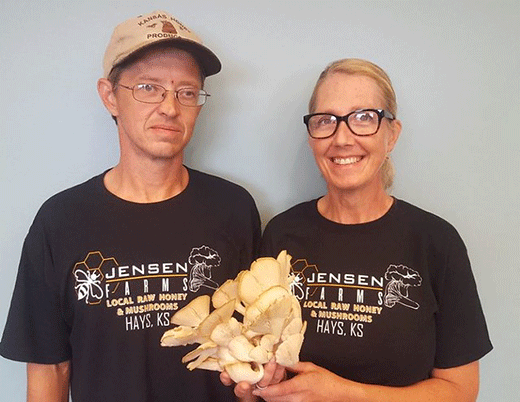
Mike and Amy Jensen | Download this photo
Kansas Profile – Now That’s Rural: Mike and Amy Jensen, Jensen Farms, Professor’s Classic Sandwich Shop & More
September 11, 2019
By Ron Wilson, director of the Huck Boyd National Institute for Rural Development at Kansas State University.
“Kansas: The Mushroom State.” No, mushrooms have not surpassed wheat or sunflowers as a leading product in Kansas. In fact, today we’ll meet the only certified and inspected mushroom grower in the state. He and his family are growing and marketing mushrooms and honey as healthy, tasty foods. Thanks to Doug and Linda Beech for this story idea.
Mike and Amy Jensen are the owners of Jensen Farms and Professor’s Classic Sandwich Shop & More in Hays. Mike grew up on a farm northwest of Hays near the site of Yocemento. Amy grew up at Hays, came to K-State on a golf scholarship, and finished her degree at Fort Hays State. They met and married.
When he was a kid, Mike enjoyed hunting for morel mushrooms. Then he started growing mushrooms himself. His family also had a large garden but it needed pollination so they wanted bees. Mike and Amy met a farmer at Osborne who had a bunch of equipment for raising bees, and he gave it to them. They started raising bees along with the mushrooms, and it changed their perspective about healthy food.
In 2003, they bought the Professor’s restaurant in Hays and leased it for others to operate. Professor’s had been a long-time fixture in downtown Hays. As their honey production increased, the Jensens needed a storefront to serve as a retail outlet.
By 2017, Professor’s restaurant had closed so the Jensens reopened it as Professor’s Classic Sandwich Shop & More. They also got a permit to raise mushrooms in the basement below.
To produce mushrooms, they hand-pack long plastic sleeves with pasteurized straw and cottonseed hulls. Then they add mushroom spawn, seal the sleeves, and hang them straight down. “In three weeks, we’ll have mushrooms,” Mike said. A 10-pound sleeve will produce ten pounds of mushrooms, four times in a season.
Contrary to what some may think, these mushrooms are not grown in compost or manure. Mushrooms are so unusual that, when the Kansas Department of Agriculture food inspector came for an inspection, Mike had to walk him through the process.
The Jensens specialize in oyster mushrooms, but they also produce shiitake and lion’s mane mushrooms. For these, the growing process is slightly different. Shiitakes are grown on blocks which the Jensens create from wood pellets, water and flour. The blocks are sterilized before spawn is added and they are sealed for a subsequent harvest.
“Our mushrooms are medicinal as well as gourmet,” Mike said. Some believe these mushrooms have anti-cancer properties and can help with Alzheimer’s and Parkinson’s disease.
“Mushrooms can clean up the environment,” Amy said. They can absorb oil, for example.
The Jensens utilize their mushrooms and honey in their restaurant dishes as well as marketing the product directly. A diner can get a meal or buy raw honey and dried mushrooms or both.
The restaurant menu includes a mushroom taco burger and mushroom stir fry, for example. Each sandwich comes with a homemade honey cookie. Made-from-scratch honey lemonade is one of the drink offerings. There are no fried foods or sodas. “We use as much farm-to-table food as we can get,” Amy said. “We want people to know where their food comes from.”
The Jensens maintain 50 to 75 beehives each year. They live on the family farm northwest of Hays, near what was the community of Yocemento. Yocemento is now just a rural crossroads with only about five residents. Now, that’s rural.
The Jensens’ two kids were active in 4-H, and the family still manages the 4-H food stand during fair week. The family is environmentally sensitive, having recently decided to phase out Styrofoam packaging. “We want to be part of the solution,” Amy said.
For more information, look for Professor’s restaurant on Facebook.
Kansas: The Mushroom State. No, wheat or sunflowers are unlikely to be displaced by mushrooms in the state motto, but the Jensens are using mushrooms and honey to promote healthy eating. We commend Mike and Amy Jensen of Jensen Farms for making a difference with innovation in their products. I hope the positive results will mushroom.
Audio and text files of Kansas Profiles are available at http://www.kansasprofile.com. For more information about the Huck Boyd Institute, interested persons can visit http://www.huckboydinstitute.org.
----------------
The mission of the Huck Boyd National Institute for Rural Development is to enhance rural development by helping rural people help themselves. The Kansas Profile radio series and columns are produced with assistance from the K-State Research and Extension Department of Communications News Media Services unit. A photo of Ron Wilson is available at http://www.ksre.ksu.edu/news/sty/RonWilson.htm.

